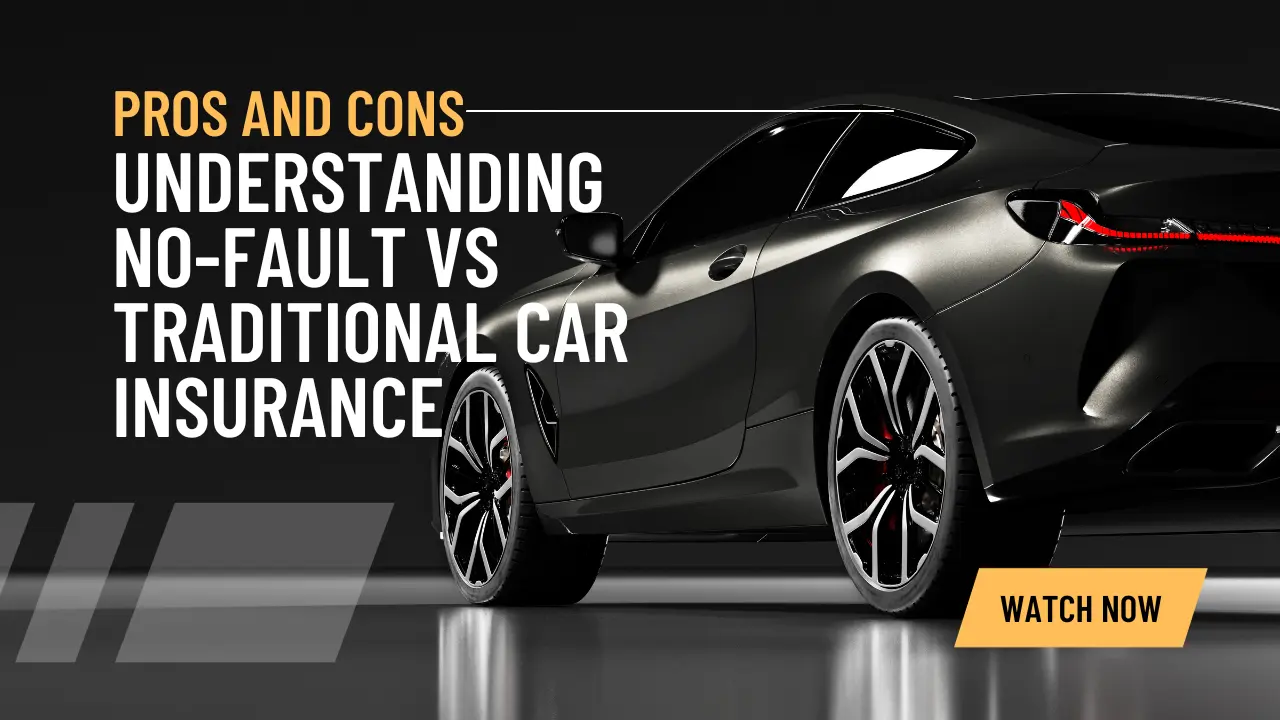Car insurance is not one-size-fits-all. There are different types of insurance systems in place, and two common approaches are “No-Fault” and “Traditional” car insurance. Each comes with its own set of advantages and disadvantages, and understanding the differences between them can help you make an informed decision about the best coverage for your needs. In this guide, we’ll explore the key aspects of both systems and the pros and cons associated with each.

No-Fault Car Insurance
No-Fault car insurance is a system where your own insurance company pays for your injury claims, regardless of who was at fault in an accident. This system aims to streamline the claims process and reduce litigation by eliminating the need to prove fault before receiving compensation.
Pros of No-Fault Car Insurance:
Prompt Medical Care: With No-Fault insurance, you can receive medical treatment quickly, as your own insurance covers your medical expenses, reducing delays in getting the care you need.
Reduced Litigation: Because fault is not typically considered in No-Fault systems, there is less need for legal battles and disputes, which can help lower overall insurance costs.
Personal Injury Protection (PIP): No-Fault insurance often includes Personal Injury Protection, which covers medical bills, lost wages, and other expenses related to your injury.
Cons of No-Fault Car Insurance:
Limited Ability to Sue: In a No-Fault system, you may have limited ability to sue the at-fault driver for non-economic damages like pain and suffering, unless the injuries meet a certain threshold.
Potentially Higher Premiums: Some argue that No-Fault systems may lead to higher insurance premiums, as insurers may pass on the cost of PIP coverage to policyholders.
Complex Regulations: No-Fault insurance can be complex due to varying state regulations, making it important to understand the specific rules in your area.
Traditional Car Insurance
Traditional car insurance, also known as “Tort” insurance, follows the traditional legal system where the at-fault driver’s insurance company pays for the damages and injuries resulting from an accident.
Pros of Traditional Car Insurance:
Full Compensation: In a Tort system, if you’re not at fault in an accident, you can seek full compensation from the at-fault driver’s insurance for medical expenses, property damage, and other losses.
Greater Control: You have more control over your claim and can negotiate with the at-fault driver’s insurance company directly.
Potentially Lower Premiums: Supporters of Tort insurance argue that it can lead to lower overall premiums because there is no need for Personal Injury Protection (PIP) coverage.
Cons of Traditional Car Insurance:
Potential Delay in Compensation: In a Tort system, compensation may be delayed as fault needs to be determined before claims can be processed.
Legal Battles: In some cases, disputes over fault and compensation can lead to lengthy legal battles, which can be stressful and costly.
Risk of Underinsured Drivers: If the at-fault driver has insufficient or no insurance, you may have to rely on your own coverage to cover the costs.
FAQ: Frequently Asked Questions
1. Which is Cheaper: No-Fault or Traditional Car Insurance?
The cost of car insurance depends on various factors, including your location and driving history. No-Fault systems may have Personal Injury Protection (PIP) coverage, which can affect premiums. Traditional insurance may have its own factors affecting costs.
2. Can I Sue in a No-Fault State?
In No-Fault states, you can typically sue the at-fault driver for damages only if your injuries meet a specific threshold, which varies by state.
3. How Do I Choose Between No-Fault and Traditional Car Insurance?
Your choice depends on your personal preferences, risk tolerance, and your state’s regulations. Consider your willingness to navigate potential legal complexities and your desire for quicker medical coverage.
4. Do All States Have No-Fault Car Insurance?
No, not all states have No-Fault systems. No-Fault insurance is specific to certain states, while others follow a traditional Tort system.
Watch the article below
In conclusion, the choice between No-Fault and Traditional car insurance is a significant decision that can impact your protection and claims process. Consider the pros and cons of each system, your individual needs, and the insurance regulations in your state when making your choice. If you have any questions or need personalized assistance in understanding and selecting the right coverage, don’t hesitate to reach out to us at Just Little Changes. We’re here to help you navigate the complex world of car insurance.
